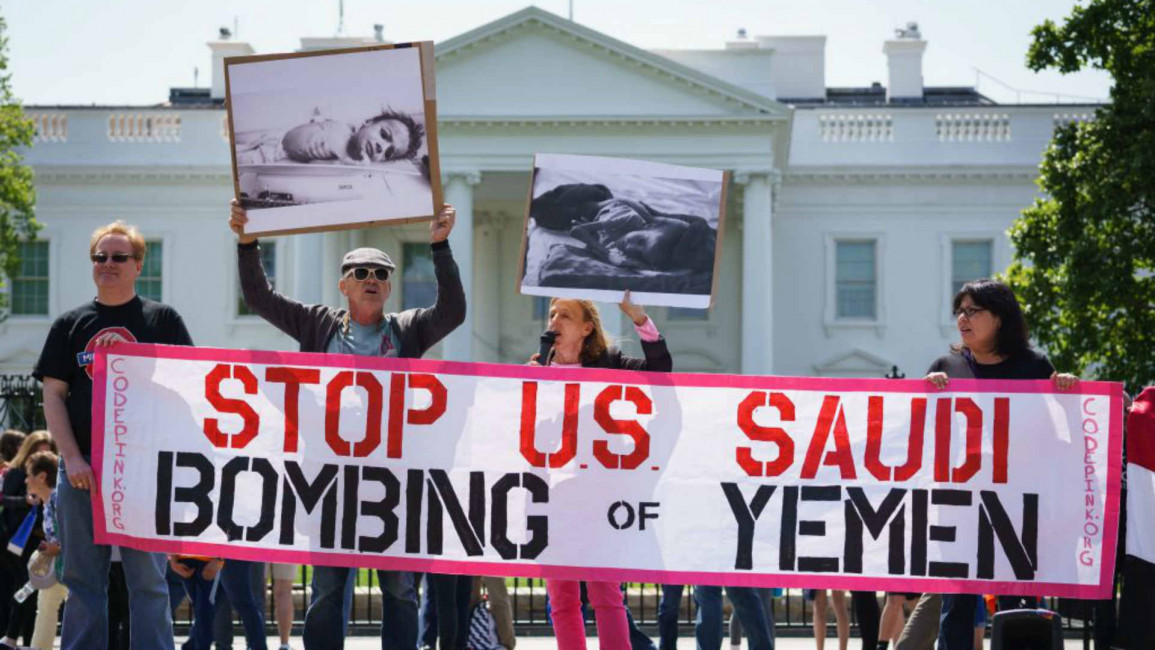US 'certifies' UAE-Saudi 'efforts' in reducing Yemen civilian deaths, despite evidence to the contrary
US 'certifies' UAE-Saudi 'efforts' in reducing Yemen civilian deaths, despite evidence to the contrary
US Secretary of State Mike Pompeo has said that he has 'certified' that the Saudi-led coalition is making efforts to reduce civilian casualties in Yemen, but rights groups remain skeptical.
2 min read
Saudi Arabia and UAE's intervention in Yemen have drawn protests in the West [AFP]
US Secretary of State Mike Pompeo appeared to give the UAE and Saudi Arabia a green light to continue air strikes in Yemen, by certifying the military coalition's "efforts" in reducing civilian casualties.
The Saudi-led coalition has faced harsh criticism from human rights groups and other international bodies for the thousands of civilian casualties caused by air strikes in Yemen.
Last month, Saudi-led coalition strikes killed dozens of civilian, including at least 40 children travelling on a bus.
Despite this, the US claimed that two Gulf states are reducing the risks to civilians during air strikes.
The Saudi-led coalition has faced harsh criticism from human rights groups and other international bodies for the thousands of civilian casualties caused by air strikes in Yemen.
Last month, Saudi-led coalition strikes killed dozens of civilian, including at least 40 children travelling on a bus.
Despite this, the US claimed that two Gulf states are reducing the risks to civilians during air strikes.
"I certified to Congress yesterday that the governments of Saudi Arabia and United Arab Emirates are undertaking demonstrable actions to reduce the risk of harm to civilians and civilian infrastructure resulting from military operations of these governments," Pompeo said in a statement.
"The Trump Administration has been clear that ending the conflict in Yemen is a national security priority," the statement added.
The US said it will continue to work with the Saudi-led coalition to end the war, allow civilians to access aid, and "mitigate the impact of the conflict on civilians and civilian infrastructure".
Pompeo said he delivered the certification on Tuesday to Congress, as required by US law to continue American refueling of Saudi and UAE warplanes in the conflict.
US Defence Secretary James Mattis held talks with UAE officials at the end of September, after warning that Washington's support for the Saudi-led coalition's military intervention in Yemen was not unconditional.
On Wednesday, Mattis said he supported Pompeo's move.
"I endorse and fully support Secretary Pompeo's certification to the Congress that the governments of Saudi Arabia and United Arab Emirates are making every effort to reduce the risk of civilian casualties and collateral damage to civilian infrastructure resulting from their military operations to end the civil war in Yemen."
He based this assumption that the Saudi-led coalition is working to reduce civilians casualties due to its "support for... UN-led efforts... to achieve a negotiated end to this fighting".
The Saudi-led coalition intervened in against Yemen rebels in March 2015 after the Houthis ousted President Abd Rabbo Mansour Hadi's government from the capital Sanaa and seized control of huge areas of the country.
Around 13,000 people are believed to have been killed in the war, most of them civilians.
UN Secretary-General Antonio Guterres has described Yemen as the "world's worst humanitarian crisis", while groups such as the Arms Under Control collective have campaigned against weapons sales to the Saudi-led coalition.
Agencies contributed to this story.
"The Trump Administration has been clear that ending the conflict in Yemen is a national security priority," the statement added.
The US said it will continue to work with the Saudi-led coalition to end the war, allow civilians to access aid, and "mitigate the impact of the conflict on civilians and civilian infrastructure".
Pompeo said he delivered the certification on Tuesday to Congress, as required by US law to continue American refueling of Saudi and UAE warplanes in the conflict.
US Defence Secretary James Mattis held talks with UAE officials at the end of September, after warning that Washington's support for the Saudi-led coalition's military intervention in Yemen was not unconditional.
On Wednesday, Mattis said he supported Pompeo's move.
"I endorse and fully support Secretary Pompeo's certification to the Congress that the governments of Saudi Arabia and United Arab Emirates are making every effort to reduce the risk of civilian casualties and collateral damage to civilian infrastructure resulting from their military operations to end the civil war in Yemen."
He based this assumption that the Saudi-led coalition is working to reduce civilians casualties due to its "support for... UN-led efforts... to achieve a negotiated end to this fighting".
The Saudi-led coalition intervened in against Yemen rebels in March 2015 after the Houthis ousted President Abd Rabbo Mansour Hadi's government from the capital Sanaa and seized control of huge areas of the country.
Around 13,000 people are believed to have been killed in the war, most of them civilians.
UN Secretary-General Antonio Guterres has described Yemen as the "world's worst humanitarian crisis", while groups such as the Arms Under Control collective have campaigned against weapons sales to the Saudi-led coalition.
Agencies contributed to this story.


![President Pezeshkian has denounced Israel's attacks on Lebanon [Getty]](/sites/default/files/styles/image_684x385/public/2173482924.jpeg?h=a5f2f23a&itok=q3evVtko)



 Follow the Middle East's top stories in English at The New Arab on Google News
Follow the Middle East's top stories in English at The New Arab on Google News


